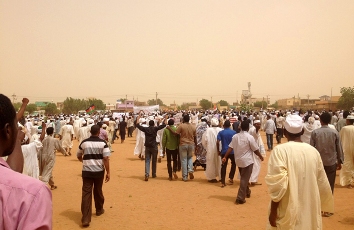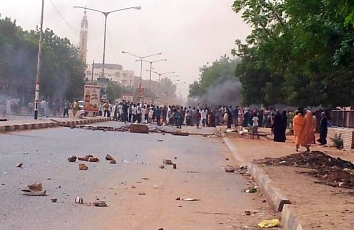Sudan’s clampdown on Friday protests triggers confrontation with opposition parties
June 29, 2012 (KHARTOUM) – Sudanese authorities used excessive force to break up several demonstrations that erupted following Friday’s prayer in sporadic parts of the capital Khartoum and 12 regional towns, in the latest crackdown on the wave of dissent that has been gripping the country for the past two weeks.

The name “elbow licking” stems from the expression “lick your elbow” which the NCP vice-chairman Nafie Ali Nafie used in the past to say those seeking to overthrow the party are attempting the impossible.
The first and strongest protest, according to activists, took place in Wad Nubawi area in Omdurman, the bastion of the Ansar religious sect of the National Umma Party (NUP) led by Former Prime Minister AL-Sadiq al-Mahdi.
Police forces surrounded Wad Nubawi mosque as thousands of worshipers arrived. The situation grew in intensity when Al-Mahdi, flanked by hundreds of his supporters, arrived in the mosque to chants of regime falls.
Al-Mahdi addressed the worshipers and said that Sudan was now at a crossroad after the current Islamist regime failed.
He stated to the disappointment of many worshipers who expected him to lead the demonstrations that efforts were still underway to agree on an alternative to the regime.
“But as we agree on the alternative, we will organize sit-in in all parts of Sudan” he said, adding that the right to hold sit-ins is guaranteed under the law and constitution”
Al-Mahdi however warned the authorities against the use of violence saying it will breed violence and lead Sudan into the same situation as Syrian. The veteran opposition leader then exited the mosque under tight security.
Eye witnesses reported that security forces fired teargas inside the mosque before worshipers could march out. Police forces later used batons and rubber bullets to disperse around 300 protesters who took to the street, inflicting injuries on some of them, the witnesses said.
Wad Nubawi protests, which lasted for 8 hours during which protesters hurled rocks at security forces, shortly spilled over to other parts of Omdurman, including Ombada area, where thousands of protesters blocked main roads.
One eye witness told Sudan Tribune that plainclothes security agents known as “Rabata” were very violent with the protesters. He said that they beat everyone who was carrying a mobile phone and arrested a number of journalists including an AFP cameraman while they covered the events.

Protests also erupted in the evening in parts of Khartoum town including Al-Kalakla and Al-Deim.
The protests were not limited to Khartoum. In Madani, the provincial capital of AL-Jazzera State, hundreds of protesters burned tires, blocked roads. The towns of Al-Obayid and Al-Nuhud in North Kordofan State also witnessed protests in which many activists were arrested by security forces.
An official with the Islamist opposition Popular Congress Party (PCP), who asked not be named, told Sudan Tribune that security authorities had arrested four middle-rank leaders of the party during Al-Oabeid protests and two during the protests in Madani.
He said that two other PCP members were arrested in Khartoum on Thursday’s night. According to him, more than 15 PCP members most of whom are youth have been arrested so far.
Meanwhile, the secretary of the NCP’s organization department, Amar Bashari, told the pro-government Al-Shoroog Satellite TV channel on Friday that the protests were organized by opposition parties.
He accused the opposition of trying to ignite sedition and mislead citizens. The NCP official stressed that what opposition parties are allegedly doing is “against the law.”
The Secretary-General of the armed rebel Sudan People’s Liberation Movement North (SPLM-N), Yasir Arman, issued a statement on Thursday saying that ousting Al-Bashir’s regime will directly serve the interest of the Sudanese economy and the living conditions of ordinary citizens.
According to Arman, the ongoing “uprising” will reach its logical conclusion in the fall of the regime and lead to the creation of a democratic alternative.
The current protest movement was triggered by government plans to end fuel subsidies as part of what officials say are an austerity package that includes drastic cuts in government size and expenditure in order to make up for a budget deficit of 2.4 billion US dollars.
Initially started by students at Khartoum University on 16 June, the protests widened over the following days to incorporate many other sectors of the society and reach towns beyond the capital.
Sudan’s economy has been grappling with rising inflation, which hit 30 percent in May, and a depreciating currency since the country lost 75 percent of oil production with South Sudan secession last year.
(ST)
